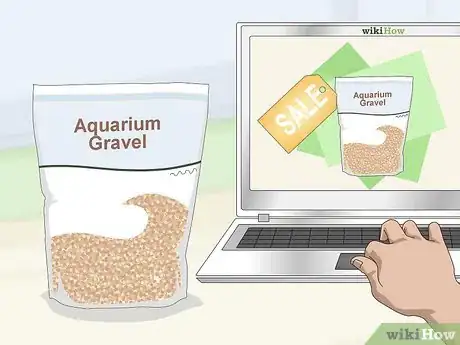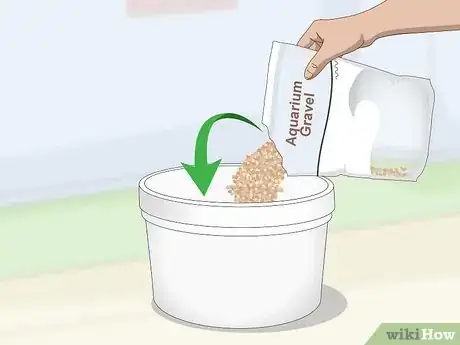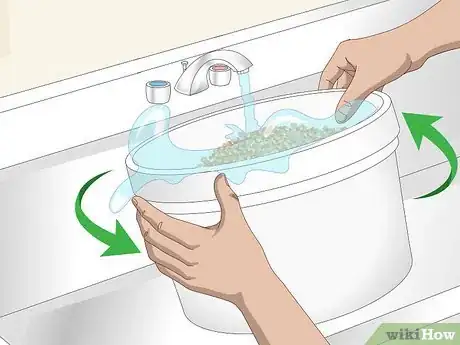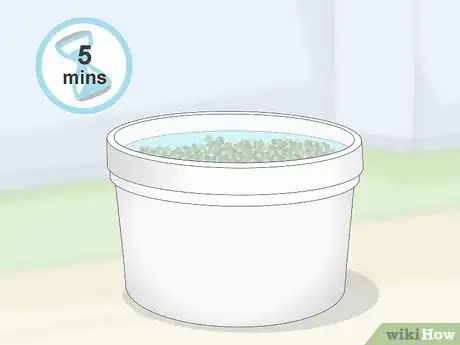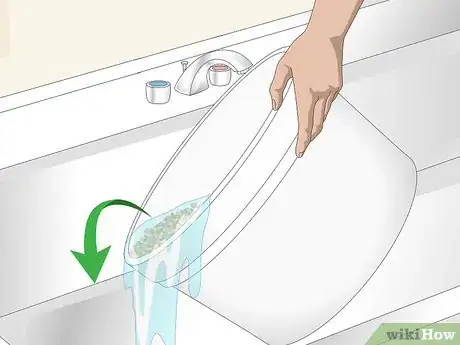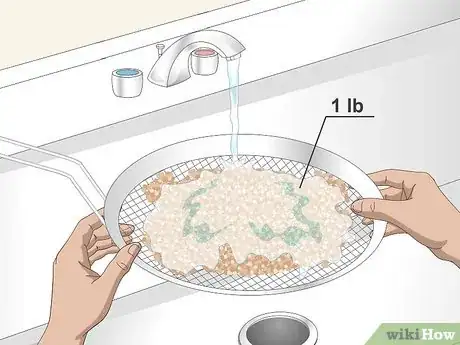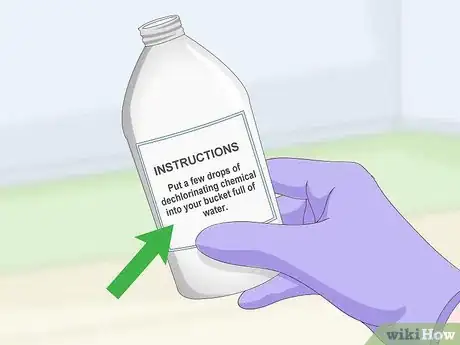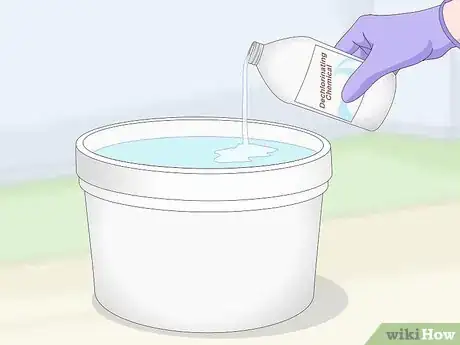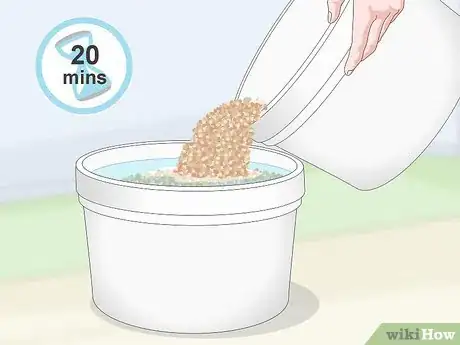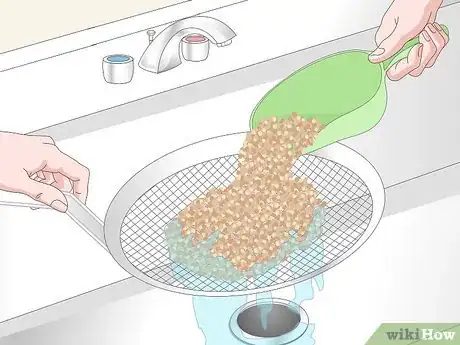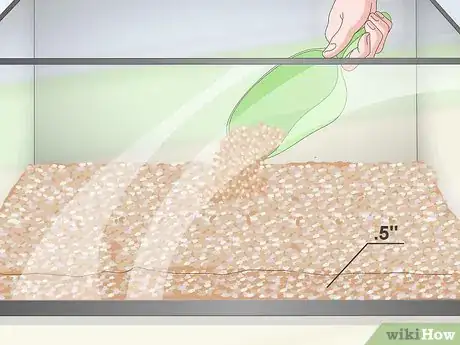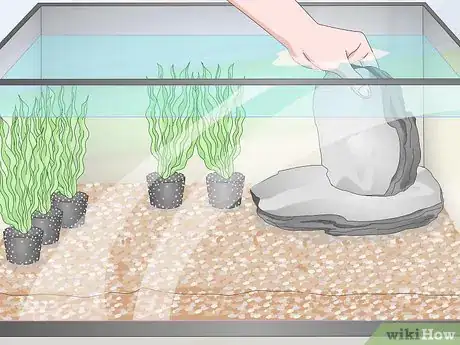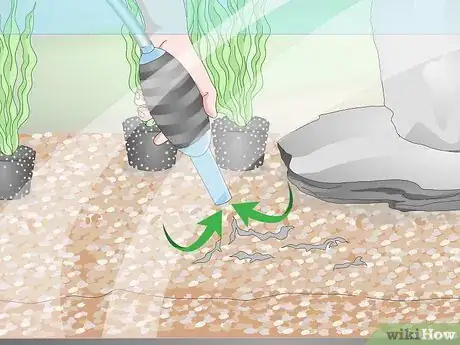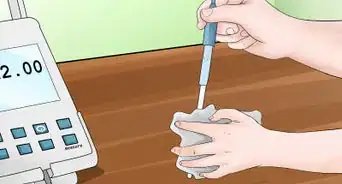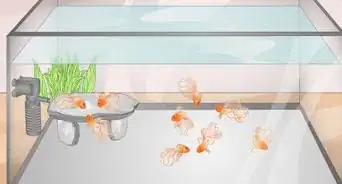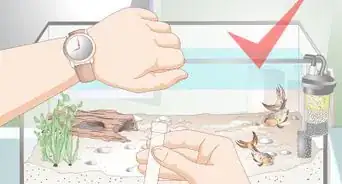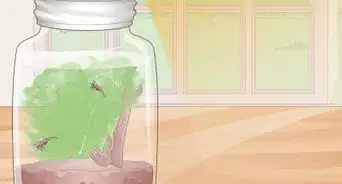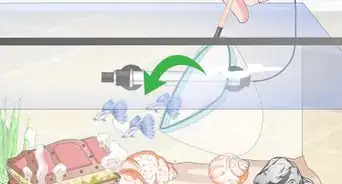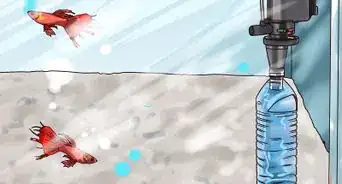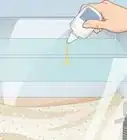This article was co-authored by Doug Ludemann. Doug Ludemann is the owner and operator of Fish Geeks, LLC, an aquarium services company based in Minneapolis, Minnesota. Doug has worked in the aquarium and fish-care industry for over 20 years, including having worked as a professional aquarist for the Minnesota Zoo and Shedd Aquarium in Chicago. He received his Bachelor of Science in Ecology, Evolution, and Behavior from the University of Minnesota.
There are 7 references cited in this article, which can be found at the bottom of the page.
wikiHow marks an article as reader-approved once it receives enough positive feedback. In this case, 100% of readers who voted found the article helpful, earning it our reader-approved status.
This article has been viewed 122,876 times.
Gravel is a popular type of substrate that can be added to the bottom of your fish tank.[1] If you plan on adding gravel to your tank, it's important to wash the gravel to remove dust and other imperfections that could cloud your fish tank water or make your fish sick. To wash your gravel, rinse it several times under cold water and add a dechlorinating agent before incorporating it into your tank environment. Never use soap or other cleaners because the chemicals could be harmful to your fish.
Steps
Rinsing the Gravel
-
1Purchase aquarium gravel online or at a pet store. Fish tank gravel comes in different colors, shapes, and sizes. Purchase gravel that is large and coarse enough to allow water flow, but fine enough to promote the growth of helpful bacteria.[2]
- Even if your gravel says “pre-washed,” you should still wash it before adding it to your fish tank.
- If you're unsure of what kind of gravel would be best for your fish, ask a pet-store employee for help.
-
2Fill a 5 US gal (19,000 ml) bucket with the gravel. Open the bag of gravel and pour it into a bucket. Only rinse 5 pounds (2.3 kg) of gravel at a time. If you need to clean more than 5 pounds (2.3 kg) of gravel at a time, clean the gravel in separate batches.[3]
- It's harder separating the large and small dust and dirt particles from the gravel if you wash more than 5 pounds (2.3 kg) of gravel at a time.
Advertisement -
3Fill the bucket with cold water and swish the gravel around. The water should rise above the gravel about 1 inch (2.5 cm). Shake the bucket back and forth to swish the water and rinse the gravel.[4]
-
4Let the gravel soak for 5 minutes. Soaking the gravel will cause dust and dirt to rise to the top of the water and will make the water murky and gray. As you continue the rinsing process, the water should start to become more clear.[5]
-
5Pour out the water and repeat the rinsing process 3 times. Tip the bucket over and empty the water while keeping the gravel in the bucket. Then, refill the bucket, let it sit, and pour out the water again. This will ensure that you get all of the loose particles out of the gravel.[6]
- By the third rinsing, the water should appear more clear.
-
6Rinse 1 pound (450 g) of the gravel in a strainer. Scoop the gravel into a strainer. Use your faucet or a hose to rinse it down. Continue rinsing the gravel into the strainer until the water runs clear. Then, take the strained gravel and place it in different dry bucket.[7]
- Straining 1 pound (450 g) of the gravel at a time will make rinsing it more manageable.
Dechlorinating the Gravel
-
1Read the instructions on your dechlorinating chemical. Purchase dechlorinated water online or at a pet store. Read the instructions thoroughly so that you know how much of the chemical you need to add to your water.[8]
- Dechlorinated water is added to water to make it habitable for fish.
- Wear rubber gloves when handling the chemical.
-
2Fill a bucket with water and add the dechlorinating chemical. Fill the bucket with 2–3 US gal (7,600–11,400 ml) of water and then drop the dechlorinated chemical into the water. Swirl the water around in the bucket to mix it.[9]
- Most dechlorinating kits will come with a dropper that you can use to add the chemical.
-
3Pour the gravel into the water and let it soak for 20 minutes. Scoop the gravel into the water slowly so that it doesn't splash. During this time, the dechlorinating chemical will remove harmful chlorine from the gravel.[10]
-
4Drain the gravel through a strainer. Scoop the gravel from the bucket to a strainer to strain out the dechlorinated water. Once it's strained, pour the gravel into a different, dry bucket.[11]
- Your gravel is now clean and not harmful for the fish tank environment.
Adding the Gravel and Washing the Gravel
-
1Add a .5 in (1.3 cm)-thick layer of gravel at the bottom of your fish tank. Gently place the gravel at the bottom of the tank so that you don't scratch or damage the fish tank. Smooth out the gravel with your hands so that it's an even layer.[12]
-
2Place rocks and plants over the gravel to give your fish a habitat. Anchor the plants into the gravel so that they don't float to the surface. You can place the rocks on the bottom of the tank in whatever way you think looks best. Add other things like wood or fish tank figurines to give your tank more personality.[13]
-
3Clean the gravel with a siphoning kit twice a month. A siphoning kit, or gravel cleaner, looks like a clear tube with a hose attached to it. Place the clear tube into the water and put the hose in a bucket. Shake the plastic tube up and down to start siphoning the water and dip the end of the clear tube into the gravel itself. The gravel should stay stuck in the tube until you put your hand on the end of the hose, which will release it. This will siphon away the dirt and fish waste through the tube while keeping the gravel on the bottom of the tank.[14]
- You can use the same siphon to clean the gravel.
- Do not clean more than 20% of the water at a time or you will alter the pH levels of the water, which could hurt your fish.
- You can purchase a siphoning kit online or at a pet store.
Community Q&A
-
QuestionWhat colors should I choose if I have Oscars?
 Community AnswerIt's up to you. Black and orange stones would match the scheme of your fish, but it's really up to you and your own aesthetic.
Community AnswerIt's up to you. Black and orange stones would match the scheme of your fish, but it's really up to you and your own aesthetic. -
QuestionCan I keep a stone from the road in my tank?
 Community AnswerI do not really recommend it but yes, you can put a stone from the road if you wash it very well and dry it. I recommend buying rocks in aquarium pet shops.
Community AnswerI do not really recommend it but yes, you can put a stone from the road if you wash it very well and dry it. I recommend buying rocks in aquarium pet shops. -
QuestionI didn't rinse the gravel and now the water is cloudy. Can I just keep removing the water daily, or do I have to take all the gravel out?
 Community AnswerIt's up to you, but I think it would be easier to just empty the tank, rinse the gravel, and re-fill it rather than change the water daily.
Community AnswerIt's up to you, but I think it would be easier to just empty the tank, rinse the gravel, and re-fill it rather than change the water daily.
Things You'll Need
- Fish tank gravel
- 5 US gal (19,000 ml) bucket
- 2 buckets
- Water
- Dechlorinating chemical
- Strainer
References
- ↑ Doug Ludemann. Aquarium Care Professional. Expert Interview. 27 August 2019.
- ↑ https://aquariuminfo.org/beginner.html
- ↑ https://www.aquariumcarebasics.com/aquarium-water-quality/cleaning-new-aquarium-gravel/
- ↑ https://www.aquariumcarebasics.com/aquarium-water-quality/cleaning-new-aquarium-gravel/
- ↑ https://www.aquariumcarebasics.com/aquarium-water-quality/cleaning-new-aquarium-gravel/
- ↑ https://www.aquariumcarebasics.com/aquarium-water-quality/cleaning-new-aquarium-gravel/
- ↑ https://youtu.be/2MZa8GdaC4U?t=369
- ↑ https://www.pbspettravel.co.uk/blog/how-to-keep-your-fish-tank-clean/
- ↑ https://aquariuminfo.org/beginner.html
About This Article
To prepare fish tank gravel, open the bag of gravel, pour it into a bucket, and fill the bucket with cold water until it covers the gravel by an inch. Next, swish the gravel around and let it soak for 5 minutes so the dust and dirt can rise to the top of the water. Then, pour out the water and repeat the process 3 times until the water looks clear. Finally, strain and dechlorinate the gravel before adding it to the tank. For tips on the dechlorinating process, read on!

